A garden of poems(The Third Period)
- 格式:doc
- 大小:23.95 KB
- 文档页数:5
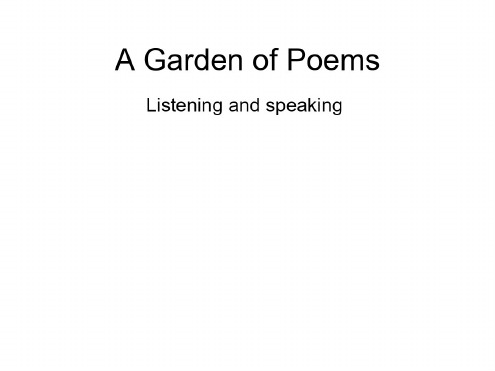
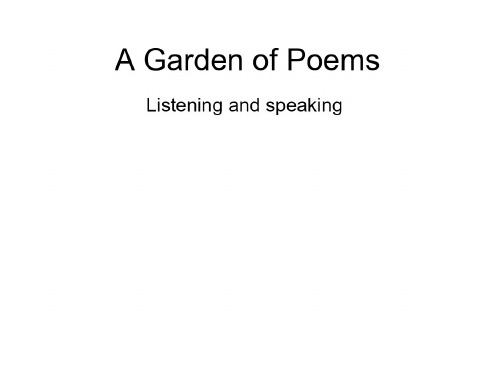
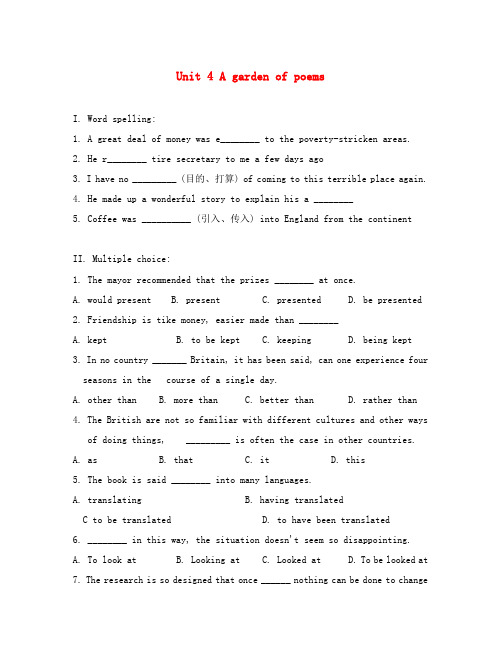
Unit 4 A garden of poemsI. Word spelling:1. A great deal of money was e________ to the poverty-stricken areas.2. He r________ tire secretary to me a few days ago3. I have no _________ (目的、打算) of coming to this terrible place again.4. He made up a wonderful story to explain his a ________5. Coffee was __________ (引入、传入) into England from the continentII. Multiple choice:1. The mayor recommended that the prizes ________ at once.A. would presentB. presentC. presentedD. be presented2. Friendship is tike money, easier made than ________A. keptB. to be keptC. keepingD. being kept3. In no country _______ Britain, it has been said, can one experience four seasons in the course of a single day.A. other thanB. more thanC. better thanD. rather than4. The British are not so familiar with different cultures and other waysof doing things, _________ is often the case in other countries.A. asB. thatC. itD. this5. The book is said ________ into many languages.A. translatingB. having translatedC to be translated D. to have been translated6. ________ in this way, the situation doesn't seem so disappointing.A. To look atB. Looking atC. Looked atD. To be looked at7. The research is so designed that once ______ nothing can be done to changeitA. beginsB. having begunC. beginningD. begun8. ________ in thought, he almost ran into the car in front of him.A. LosingB. Having lostC. LostD. To lose9. _________ the general state of his health, he knows it may take him a while to recover fromthe operation.A. GivenB. To giveC. GivingD. Having given10. ________ by the bullets flying at them from all directions, the enemy went into the forestA. Be confusedB. ConfusingC. Having confusedD. Confused11. Reading poetry can open doors to __________ new ways of expressing yourself.A. findB. findingC. foundD. founded12. He spoke in such a high voice ________ at the further end of the room.A. as to be heardB. to be heardC. as to hoarD. to hear13. To my disappointment the computer I had _________ was out of order again.A. repairedB. repaired itC. had repaired itD. had repaired14. Not only __ a promise, but he also kept it.A. had he madeB. he'd madeC. did he makeD. he made15. He made a great effort and ________ the environment.A. contributed to protectingB. contributed to protectC. contributed for protectingD. contributing for16. __________ the wall, the rope lay upon the pillow on the bed.A. Connected toB. Connected withC. Connecting toD. Beingconnected with17. _______ from what he said, the scientist must have experienced a lot of difficulties inhis invention.A. JudgedB. Being judgedC. Judging D Having judged18. The prize will be given to ______ has done the best in the contestA. whoB. whomeverC. no matter whoD. whoever19. Getting off the bus, she found her new handbag _________ .A. cutB. losingC. disappearedD. missed20. ______ in 1636, Harvard is one of the most famous universities in the United States,A. Being foundedB. It was foundedC. FoundedD. Founding21. _______ his old age, the worker was working hard with young men.A. ThoughB. AsC. Because ofD. Despite22. Her singing will surely ______ greatly to the success of the party.A. aidB. supportC. addD. contribute23. Lucy is very shy and never speaks ________ .A. until speakingB. unless spoken toC. unless speaking toD. only if spoken to24. _______ the news of the victory in the newspaper, all people jumped with joy.A. On readingB. When readC. To readD. On being read25. No matter how frequently _______ , the works of Beethoven always attract large audience.A. performingB. to be performedC. they were performedD. performed26. With his son _______ , the old man felt unhappy.A. to disappointB. to be disappointedC. disappointingD. being disappointed27. The article _______ more attention to the problem of cultural inference in foreign languageteaching and learning.A. calls forB. calls upC. cares forD. rings up28. Great ________ the changes here since 1990.A. have beenB. has beenC. areD. is29. In the _______ of these conditions, it won't work well.A. absenceB. shortageC. lackD. disadvantage30. ______ in China, me the American romantic poets.A. Greatly lovedB. Having greatly lovedC. Being greatly lovedD. Having greatly lovedIII. Correction:Life m a desert is almost as hardly for men and women 1.________as it is plants. Few people can live there. In many 2.________parts of the world the people live in deserts lead much 3.________the same kind of life. This is because they must have water 4.________for themselves and the/r animals and thereforethey have to go which the water is. In some deserts a 5.________few ram falls in certain seasons of the year, then a crop 6.________of glass grows up after them_ People follow rite rein so 7.________as to let their sheep to eat the grass. They do not live 8.________in one place or move about according to seasons. People 9.________who spend their life in this way are calling nomads(游牧民族).10.________IV. Writing:最近,你校同学参加了某英文报组织的一场辩论。

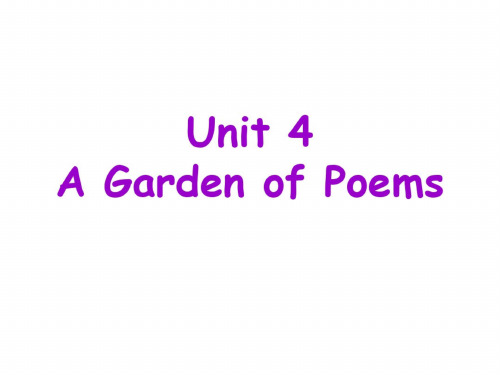
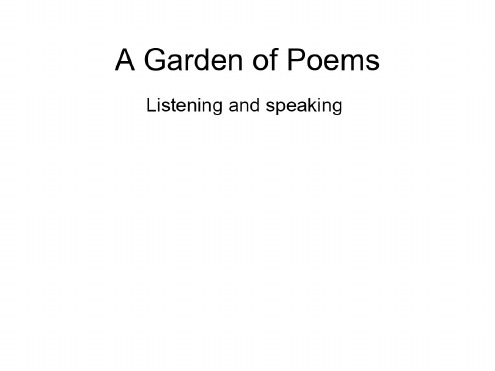
Unit 4 A garden of poemsThe First PeriodWarming-up & ListeningTeaching Aims:1.Talk about rhymes, songs, limericks and poems to raise the students’ interest in po etry.2.Improveing the students’ listening ability.3.Introduce some poems to the students.Teaching Difficult points:1.To teach the students how to grasp the detailed information to finish the listening tas k.2.How to make every students active in this lesson.Teaching Aids:1.a computer2.a projectorTeaching Procedures:(Play the song “Ten little Indian boys”)Step I Greetings and Lead in.Step II Warming up.Step III. Pre-listeningStep IV. While listeningStep V. Post-listeningStep VI. Listening on the workbook.Step VII. Listening and imitating.Step VIII. Post-listeningYou’ve done a good job today. Let’s enjoy some more poems. And you are required to recite some of these poems. You c an recite and many as possible. We will check the next period.1)WomenIf you kiss her, you are not a gentlemanIf you don’t, you are not a manIf you praise her, she thinks you are lyingIf you don’t, you are good for nothingIf you agree to all her likes, she is abusingIf you don’t, you are not understandingIf you make romance, you are an experienced manIf you don’t, you are half a manIf you visit her too open, she thinks it’s boringIf you don’t, she accuses you of double crossingIf you are well dressed, she says you are a playboyIf you don’t, you are a dull boy“O Lord, tell me what to do. AMEN”Step IX Homework.Recite one or two poems and get ready for tomorrow’s lesson!The 2nd period Reading (English Poetry)Teaching Goals:1. Learn about poets and poems of different countries.2. The similarities and differences between the Chinese and English poets and poems.3. Improve the student’s reading ability.Teaching procedures:Step1 Greeting & Warming-upStep 2 Lead-inStep 3 Fast-readingStep 4 Careful-readingStep 4 Post-readingStep 5 Further-understandingStep 6 EnjoymentStep 7 DiscussionStep 8 HomeworkThe 3rd period SpeakingTeaching aims:1. Talking about poems to raise the ss’interest in poems.2. Making dialogue to improve the ss’speaking ability.Teaching procedures:Step1 Greeting & Lead-inStep 2 Warming-upStep 3 SpeakingStep 4 TalkingStep 5 HKT: You know one way to stop poems from disappearing is to prove that poetry is alive and around us everywhere. So to hold a poetry festival is a good idea.Now you are asked to help organize a poetry festival at your school. The festival will t ake place on two days and it is hoped that the programme will be interesting and varie d. Work in groups to discuss and decide about the programme for the festival. Discuss which forms of poetry should be part of the festival and which not.The Fourth Period Word Study and GrammarTeaching aims:1.Learn and master the Past Participle used as adverbial.pare the differences between the Present Participle and the Past Participle used as adverbial.Teaching Procedures:Step 1 SongStep 2 Word studyStep 3 GrammarStep 4 PracticeStep 5 ConsolidationStep 6 ComparisonHomeworkFinish the word study and grammar part on the workbook.The 5th Period Intergrating SkillsGoals/objectives:Students will:1. Learn to read poems aloud with expression.2. Learn to enjoy simple poems and interpret basic elements of poetry.3. Practice listening activelyStep One Warming-upStep Two Pre-readingStep Three While-readingStep Four Post-readingStep Five Exercise IStep SixExercise IILet students take out their exercise books. Do exercise 2 on Page 32 with the poem as "right here waiting".Homework:1. Draw a couple of comic strips according to the imagery of Dust of Snow2. Finish the workbook passage "The Birth of Modern Poetry" by yourself.Unit 4 A garden of poemsScanningScan the text and answer the questions.1.Whose poetry reminds us of Su Dongpo?John Donne reminds readers of Su Dongpo.2.Whose poetry reminds Chinese readers of Du Fu or Li Bai?Wordsworth, Byron, and Keats remind readers of Du Fu and Li Bai.3.Can you name some famous Chinese poets?Li Bai, Du Fu, Wang Wei, Bai Juyi etc.4.Write down 5 key words that you would expect to find in a text about poetry. Poem, poet, rhyme, style, image (literature, language, form, line)Fast-readingQuestions1. What are the differences between poetry and other forms of literature?2. Whose poetry reminds Chinese readers of Du Fu or Li Bai? Whose of Su Dongpo? William WordsworthGeorge Gordon Byron John DonneJohn KeatsCareful-ReadingPara. 1 The characters of poetry.Para. 2 Chinese ancient poets and poetry.Para. 3 Early English poets.Para. 4 English poets of the 19th century.Para. 5 Why modern poets have special attraction?Para. 6 The introduction of English poetry to China.Para. 7 Why more people are interested in English poetry.Divide the text into 4 partsPart 1 Para 1 Brief introduction to poetryPart 2 Para 2 Chinese poetry and poetsPart 3 Para3,4.5 History of English poetryPart 4 Para 6,7 Poems can be bridges between the east and the westChoose the best answer1.Modern English came into being from about the middle of the ____ century. AA.16thB. 17thC. 18thD. 19th2. The poetry of Marvell reminds Chinese readers of the poems by ____. CA.Du FuB. Li BaiC. Su DongpoD. Gou Moruo3. Byron’s “Isles of Greece” is an example of _____. BA. a sonnetB. romantic poetryC. nature poetryD. modern poetry4. The wider public in Cina discovered English poetry at the beginning of the _____ century. DA.17thB. 18thC. 19th.D. 20th5. The advantage of reading English poetry in Chinese translation is ____. DA.that you have more adviceB. that something of the spirit is lostC. that you understand it betterD. that you learn how to express yourself in new ways True or False1.The wider public in China discovered English poetry at the beginning of the 19th century. F2. Modern English came into being from about the end of the 17th century.3. The advantage of reading English poetry in Chinese translation is that you understand it better.Further-understanding1. When did modern English start ?Modern English started around the Time of William Shakespeare,towards the end of the sixteenth century .2. Why do modern poets have their special attraction?Because they stand closest to us both in the language and images they use .3. When did Chinese readers start reading more foreign poetry?Towards the end of the nineteenth century Chinese readers started reading moreforeign poetry .4. What are the differences between poetry and other forms of literature?①Poetry plays with sounds, words and grammar②Poetry is difficult to write,but interesting to read③Poetry calls up all the colors, feelings,experiences and curious images of a dream world.there are some words in bold; can you tell what do they refer to?Para. 1 That makes poetry difficult to write, but very interesting to read.------Poetry plays with sounds,words and grammar.Para. 3 Despite its short history,there is a lot of good poetry around.------English poetry’sPara. 4 The style and atmosphere in their poems has often…------William Wordsworth,Byron,John KeatsPara. 5 Finally, modern poets have their special …in the language and images they use.------modern poetsPara. 7 They can help us to understand each other better,…------poems and literature DiscussionAre poems good for our life? What can we get from poems?1. Poems bring passion (激情) to our life.2. Poems help us to understand life, virtues, beauty and romance…3. Poems make us know, we are here,we can make our life and the world more colorful!。
Unit 4 A garden of poems-The Second PeriodTeaching Aims:1. Learn the following words and expressions: call up, glory, pattern, belong to, absence, translate, come into being, play with, despite, time, remind…of, lesd to2. Learn about poets and poems of different countries.3. Improve the students' reading ability.Teaching Important Points:1. The usages of some useful words and expressions.2. The similarities and differences between the Chinese and English poets and poems.Teaching Difficult Point:How to grasp and remember the detailed information of the reading material.Teaching Methods:1. Fast-reading to grasp the main idea of the text.2. Talking method to get every student to want to express himself in English.3. Pair work or group work to get every student to join in the class activities.Teaching Aids:1. a tape recorder2. a computer3. a projectorTeaching Procedures:Step I Greetings and Revision(Teacher greets the whole class as usual and checks the students' home work.Then teacher and the students learn the new words of this period together. ) Step II Reading(A few minutes later.)T: Are you ready?S a : Yes.T: Who will give us the answers?S a: I’ll try. The style and atmosphere in the poems by Wordsworth, Byron, She lly and Keats often remind readers of Du Fu and Li Bai.S b: The works by Donne and Marvell reminds Chinese readers of Su Dongpo.T: Very well. Now read the text again, and try to grasp as much detailed in formation as you can. Then do the exercise on the screen.(Teacher shows the screen. )Read the text carefully and choose the best answer for each of the following questions:1. Modern English came into being from about the middle of the_____century.A. 16thB. 17thC. 18thD. 19th2. The poetry of Marvell reminds Chinese readers of the poems by_______.A. Du FuB. Li BaiC. Su DongpoD. Gou Moruo3. Byron's “Isles of Greece” is an example of_______.A. a sonnetB. romantic poetry!C. nature poetryD. modern poetry4. The wider public in China discovered English poetry at the beginningof the_________ century.A. 17thB. 18thC. 19thD. 20th5. The advantage of reading English poetry in Chinese translation is______.A. that you have more adviceB. that something of the spirit is lostC. that you understand it betterD. that you learn how to express yourself in new waysSuggested answers:1. A2. C3. B4. D5. DT: You've done very well. By the way, have you noticed that there are somebold words in the text? Read the text again and find out what the 'words inbold refer to. If necessary, you can have a discussion with your partner. Some minutes later, we'll check the answers.(Students begin to read the text and have a discussion. After a few minutes, teacher says the following. )T: Can you find the answers? (Ss: Yes.)Please tell us.S c:“That”in the first paragraph refers to “poetry plays with sounds, words and grammar”.S d:“its” in the fourth paragraph refers to“the poetryn’ s” .S e: “their” refers to “the nature poems by Wordsworth, Byron's Isles of Greece and the sonnets and long poems by Shelley and Keats”. And it is in the fifth paragraph, on Page 28.S f: “they”in the sixth paragraph refers to “modern poets”.S g:“They” in the third line from the bottom of the last paragraph refers to “poems and literature”.T: Are there any different opinions?S s : No, they are right.T: (Teachers shows the screen.) There are some language points you should pay attention to. Read the sentences and try to master the usages of thewords and phrases.1. play with: The little boy is playing with his dolls.(In the text“play withthe sounds , words and grammar”means “to use sounds , words and grammarperfec tly”.)2. call up.. I called up my brother and told him the good news.He was called up at the beginning of the war.3. despite: He came to school despite (in spite of) his serious illness.4. time: In his speech, he expressed the feelings of the time.5. belong to: Taiwan belongs to China.6. absence: Darkness is the absence of light.7. remind…of…Remind me of the letter.8. lead to: Differences of opinion led to fierce arguments.9. come into being: When did the Great Wall come into being?Step III Listening and Reading AloudT: Now let's listen to the tape. When I play it for the first time, just listen. Then I'll play it for the second time. This time, you can follow it in a low voice. Then read the text aloud, paying attention to your pronunciation andintonation. Do you understand? OK. Let's begin.(Teacher goes among the students, answers the students' questions and corrects the mistakes.)Step IV DiscussionT: Now please turn to Page 29,Post-read-ing 4、5 and 6. Have a discussion aboutthem. Later, I'll ask some of you to give us the answers.(After a while. )T: Who'll give us the answer to the fourth?S1 : I'll try. If a poem is translated into another language, it's changed a bit. That's to say, something of the spirit of the original works is lost.T:Quite right. Let's compare a poem by Chao Zhi with its translation.(Teacher shows the screen. )七步诗曹植煮豆燃豆萁,豆在釜中泣;“本是同根生,相煎何太急?”They were boiling beans on a beanstalk fire,Came a plaintive voice from the pot,“ ( ),why since we sprang from theselfsame root,Should you kill me with anger hot?”T:From the poem above, we can find that when a poem is translated into another language, its rhythm and rhyme, the figures of speech, etc. are differentfrom the original work…Suggested answers to Ex. 5 and Ex. 6 :5. They can be ties that bring the East and the West together and fine wineenjoyed by the East and the West.6. It means that when people from one country read the poems from another, they will be struek by what is inside the poem, so they will understand each other and become good friends.Step V Summary and HomeworkT: Today we're learnt a text about poems and poets. Read the text after class and collect as much information about the things and persons mentioned in the text as possible. Then do Ex. 3 on Page 29. Besides, we've learnt some useful words and expressions. Please tell me what they are.Ss: Play with, call up, despite, time,…(Teacher writes them on the blackboard.)T: Please remember the words and expressions and make sentences with them when you have time. That's all for today. Class is over.Step VI The Design of the Writing on the BlackboardUnit 4 A garden of poemsThe Second periodEnglish PoetryUseful words andexpressions:play with absencecall up remind…ofdespite lead totime come intobeingbelong toStep VII Record after Teaching____________________________________________________________________________________________________________________________________________________。
高二英语Unit 4 A garden of poems人教版【同步教育信息】一. 本周教学内容:Unit 4 A garden of poems二. 教学目标:1. Talk about English poetry.2. Practise expressing intention and decision.3. Learn about the Past Participle: used as an Adverbial三. 教学重点与难点:1. How to get a better understanding of the text?2. Grammar of this unit四. 具体内容:1. Some words relating to the topicclassical literature 古典文学contemporary literature 现代文学popular literature 大众文学folk literature 民间文学epic poetry 史诗narrative poem 叙事诗modern verse 现代诗prose poem 散文诗pastoral poetry 田园诗lyric poem 抒情诗ode 颂歌sonnet 十四行诗limerick 五行打油诗line 行verse, stanza 节rhyme 韵脚2. poem, poetry, poetHe asked us to write a poem about summer after class.(诗歌,诗词)This is a book of poetry which I liked best.(诗集)Li Bai and Dufu are the best poets in Chinese history.(诗人)3. get throughI finally got through at twenty past eleven.(接通)Get it through to him we must rest.(使人了解)It is difficult to get through this book in such a short time.(完成)She quickly got through all his money.(用完)4. be mad with sb. = be angry with sb.be mad about sth. = be angry at sth.She was mad with me for losing the key.They were mad about missing the train.5. patternn. Over the next months their work pattern changed.v. pattern oneself 模仿某人的样子pattern sth. upon/ on. 仿照….式样制造事物6. remindremind sb. of sth.You don’t need to remind people of their mistakes all the time.remind sb. to do sth.He reminds himself not to be late again.remind sb. thatHe had to remind her that her family was poor.7. play with 巧妙利用;讲究play down 降低;减弱play off 从中渔利;在….之间挑拨离间play up 大肆宣传;夸大某事的重要性8. call upThis morning someone called up from the city centre and asked to see me at 2 in the afternoon.(打电话)The commandar called up all his forces for the attack.(汇集)9. stand out 明显;醒目;突出;坚持;支撑Red stands out against a white background.They stood out a storm.10. absencein the absence of 缺乏….时;当….不在时In the absence of these conditions, I am afraid we can’t work together.leave of absence 请假absence of mind 心不在焉absence from school 逃学11. comparison 比较;对比;对照There is no comparison between them.My shoes are small in comparison with my sister’s.12. come into being 出现;产生;形成This is how his idea came into being.13. extraordinaryextraordinary kindness 特别的和善extraordinary weather 反常的天气extraordinary power 特权an envoy extraordinary 特使extraordinary session 临时会议14. board a train/ a ship/ a plane15. fall into 进入(某种状态)On hearing that, he fell into rage.The story falls into three parts.The river falls into the sea.16. forget about 忘记一件事或一个过程; forget 忘记一件具体的东西I forgot your request. 我忘记了你的请求。
A garden of poems(The Third Period)The Third Period Teaching Aims: 1. Review the text to finish some exercises about poems. 2. Learn and master the Past Participle used as Adverbial. 3. Do some exercises to learn the sentence transformation. Teaching Important Points: 1. How to get the students to master the usage of the Past Participle. 2. How to do sentence transformation. Teaching Difficult Point: The sentence transformation between a clause and a past participle phrase. Teaching Methods: 1. Pair work or group work to make every student active in class. 2. Discussion method to get the students to make clear what they've learned. 3. Showing and explanation methods to have the students get a clear concept about what they learn. Teaching Aids. 1. a computer 2. a projector Teaching Procedures: Step I Greetings and Revision Greet the whole class as usual. T: In this class, I'll check your homework first. In the last period, I told you to make a timeline that shows the centuries when the poets were living and their names, including all the English poets in the text and some of the Chinese poets you know. Have you finished it? (Ss: Yes.)Now I'll show the answers on the screen. Check them, please. English poets: Shakespeare(1564锝?616) Donne(1572锝?1631) John Milton(1608锝?1674) Marvell(1621 锝?678) Pope(1688锝?1744)Johnson(1709~1784) Wordsworth(1770锝?1850) Byron(1788锝?1824) Shelly( 1792锝?1822) Keats(1795锝?1821) Auden(1907锝?973) Chinese poets: Li Bai(701 锝?62) Wang Wei(701锝?61) Du Fu(712锝?70) Bai Juyi(772锝?46)Guo Moruo(1892锝?978) Step II Word Study T: Please turn to Page 29. Look at Word Study, Part 1. Fill in the blanks with words in the text. Have a discussion with your partner and then we'll check the answers. Suggested answers: 1. poem 2. rhyme 3. author 4. stories 5. poets 6. translated (put) T: As we know, if words or lines of poetry end with the same sound, including a vowel, we can say they rhyme. Who can give ussome words that rhyme? SA: I'll try. 鈥渉orse鈥漚nd鈥渕ouse鈥? 鈥渟chool鈥漚nd鈥渇ool鈥? They all rhyme. T锛歍hat's right. (Show the screen.) Now look at the screen. There are two groups of words on the screen. Please read them and match the words that rhyme. Match the words: A: 1. curious 2. image 3.glory 4. absence 5. romantic 6. atmosphere 7. special 8. embrace B: a. audience b. public c. serious d. message e. fear f. social g. base h. story T: (A few minutes later.) Have you finished? Ss: Yes. T: who will give us the answers? SB: They are: l. c;2 d;3 h;4 a;5 b;6 e;7f;8 g. Am I right? T: Sc, do you agree with him? So: Yes, he is right. Step III Grammar (Teacher shows the two sentences on the screen.) The Past Participle used as Adverbial: 1. Once published, his work became famous for the absence of rhyme at the end of each line. 2. No matter how well translated, something of the spirit of the original work is lost. T: Look at the two sentences on the screen. Who can tell us their Chinese meanings? SD The first sentence means:涓€缁忓嚭鐗堬紝浠栫殑浣滃搧灏卞洜涓嶆娂闊佃€岃憲鍚嶃€?The second means: 鍗充娇缈昏瘧寰楀啀濂斤紝涓€缁忕炕璇戯紝鍘熶綔鐨勪竴浜涚簿鍗庡氨娌℃湁浜嗐€?T: Can you think of another way to express these ideas? SE : I'll try. The first sentence can be expressed as: Once it (= his work) was published, his work became famous for the absence of rhyme at the end of each line. The second: No matter how well it (= the original work) is translated, something of the spirit of the original work is lost. T: Quite right. From the sentences we've discussed, we know that if the past participle is used as adverbial, we can change them into the adverbial clauses, which has the same meaning. Are you clear about that? Ss: Yes. T: Now turn to Page 30. Please look at Ex锛?锛嶤omplete each sentence by using the past participle of the right verb锛嶣efore doing that锛寃ho will tell the meanings of the words in the box? SF锛欼'll try. 鈥渂uild鈥漨eans鈥滃缓璁锯€濄€傗€渇righten鈥漨eans鈥滀娇鎯婃亹鈥濓紱鈥渂ite鈥漨eans 鈥滃挰鈥濓紱鈥渇ollow鈥漨eans鈥滆窡闅忊€濓紱鈥渟hoot鈥?means ee鈥漨eans鈥滅湅瑙佲€濓紱鈥済ive鈥漨eans鈥滅粰鈥濓紝鈥渆xamine鈥漨eans nd鈥渟uppose鈥漨eans T锛歏ery well锛嶯ow have a discussion in pairs and give us their proper forms锛?While doing this锛宼alk about the meaning o{each sentence锛嶰K? (Students have a discussion and teacher goes among the class and answers the questions the students ask锛? Suggested answers锛?1锛嶧rightened 2锛嶨iven 3锛巉ollowed 4锛巈xamined 5. Built 6锛巗een 7锛巄itten 8锛巗hot 9. supposed Step 鈪?Practice (Teacher SHOWS the sentences on the screen锛? 1.The castle, burned down in 1943锛寃as never built锛?2锛嶪f left alone on a deserted island锛寃hat would you do to survive? T锛歀ook at t灞眛wo sentences on the screen锛嶦ach of the sentences has a past participle锛嶩ave a discussion about them and decide their functions锛?(After a few minutes鈥?discussion锛? Sa锛欼n the first sentence the past participle phrase鈥渂urned down in 1943鈥漣s used as attribute锛巑odifying the noun 鈥渃astle鈥濓紟The meaning f the whole sentence is锛?943у煄鍫★紟鍐嶄篃娌℃湁閲嶅缓銆?Sb锛欼n the second sentence銆傗€?eft alone on a deserted island鈥漣s used as adverbial锛?expressing condition锛?T锛歐hat is the meaning of it? Sb瀛樹笅鍘汇€備綘浼氭€庝箞鍔炲憿? T锛欸ood锛嶯ow锛宭ook at the sentences on the screen and the function of each past participle phrase锛嶻ou can do it in pairs or groups锛?Tell the function of the Past Participle in the following sentences锛?1.The room锛宑onnected to the rest of the house by a long passage 锛寃as completely empty锛?2锛嶤onnected to the rest of the house by a long passage锛宼he room seems very quiet銆?3锛嶧olded in his pocket锛宼he letter wasn't found until twenty years later锛?4. He was walking around with the letter folded in his pocket. (A few minutes later锛? T锛欰re you prepared? (Ss锛歒es銆? Please tell us the function of each past participle and the meaning of each sentence 锛?Sc锛欼n the first sentence锛宨t is used as attribute锛嶵he meaning of thesentence is鏂圭浉杩炵殑灞嬪瓙閲岄潰绌烘棤涓€鐗┿€?Sd锛欼n the second sentence, the past participle phrase is used as adverbial锛?expressing the cause锛嶵he sentence means鐨勫湴鏂圭浉杩炴帴鐨勶紝鎵€浠ュ畠寰堝畨闈欍€?Suggested answers锛?3锛嶢dverbial?锛嶢ttribute淇°€?Step V Consolidation T: Look at the example on Page 30. Here are two sentences. They both have the same meaning, but their adverbials are expressed in the different ways. Study the example and then rewrite the sentences on Page 31, using a clause to substitute the past participle phrase. Suggested answers: 1. When he was asked what had happened, he told us about it. 2. As he was well known for his expert advice, he received many invitations to give lectures. 3. If we were given more time, we would be able to do the work much better. 4. Once it was translated into Chinese, the book became very popular among Chinese teenagers. 5. As she was deeply interested in medicine, she decided to become a doctor. 6. Though she was left alone at home, Sam did not feel afraid at all. Step VI Summary and Homework T: In this class, we've talked about rhyme and the use of the past participle. The past participle of the verb can be used as adverbial and attribute, such as, 鈥淥ne鈥︹€?鈥淭he castle 鈥︹€? We also know that the past participle can be expressed with a clause, such as鈥淯nited鈥︹€?Teacher writes the sentences on the blackboard. ) Today's homework: Join each pair of sentences to form one sentence, using the past participle. That's all for today. Class is over. Join the two sentences in each group. 1. Mary was shocked at what Jack had said. She didn't know what to say at first. 2. The mirror was broken. The mirror was lying on the ground. 3. l went into the dark room. 1 was followed by my best friend. 4: The park is the most beautiful place in the city. It was destroyed by thestorm last Sunday. 5. The dog barked at us. The dog was tied to a pole by the door. 6. They were sad to see a sea of flowers. The flowers were covered by the heavy snow.7. The scientist is well known for his knowledge. The scientist is able to help the workers to get out of their difficulty. 8. The coins were collected by my cousin. The coins were made in Tang Dynasty. Step VII The Design of the Writing on the Blackboard Unit 4 A garden of poems The Third Period Grammar: The Past Participle used as Adverbial1. 1. Once published, his work became famous for the absence of rhyme at the end of each line. No matter how well translated, something of the spirit of the original work is lost. 2. The castle, burned down in 1943, was never built. If left alone on a deserted island, what would you do to survive? 3. United, we stand 锛沝ivided, we fall. If we are united, we will fall锛沬f we are divided, we will fall. Step VIII Record after Teaching ______________________________________________________ ___________________________。